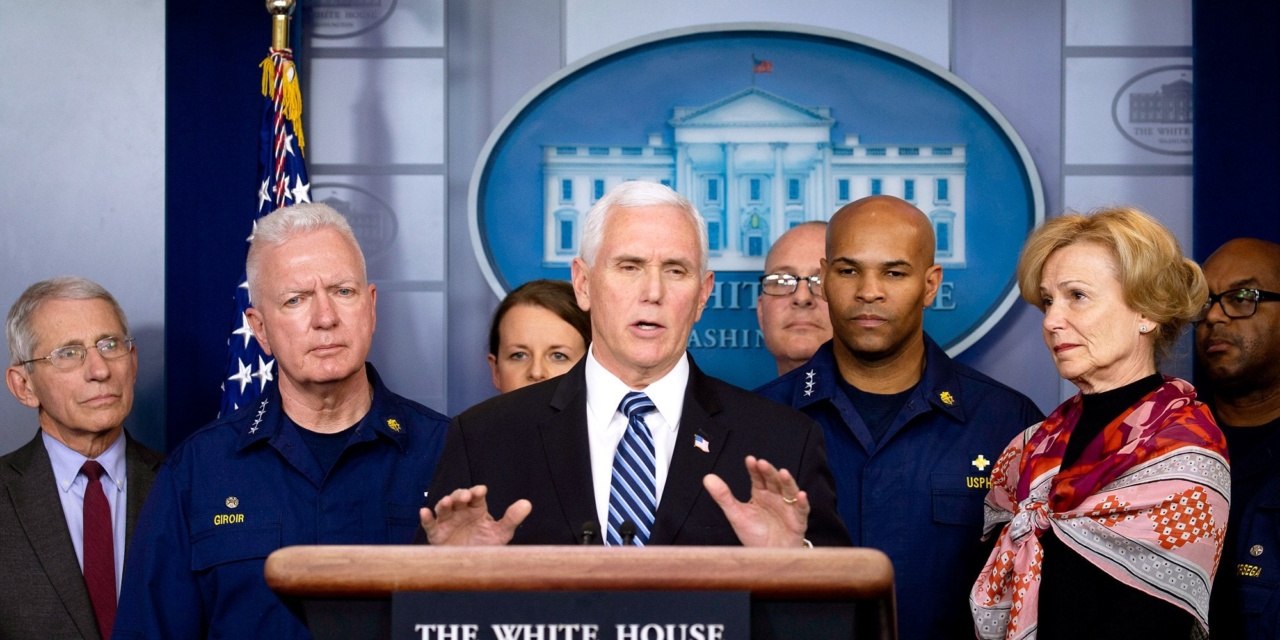Vice President Mike Pence speaks at a White House press briefing (Tasos Katopodis/Getty)
Donald Trump continues to defy reality, as medical specialists and officials at Federal, state, and local level try to deal with the Coronavirus crisis.
Trump made a brief appearance during a White House press conference on Sunday, preferring to talk about the Federal Reserve’s interest rate cut and to rail against his supposed foes rather than address the escalation of the virus.
Having lied on Friday that Google would have a website ready by yesterday for Americans to check if they need testing, Trump declared, “I don’t know where the press got their fake news.”
He then listed heads of corporations with whom he was supposedly working, a refrain of his Friday appearance — shaking hands in defiance of medical advice — alongside CEOs in the White House Rose Garden.
Before he left the briefing, he insisted that the Administration had “tremendous control of” Coronavirus: “Young people, people of good health, and groups of people, just are not strongly affected.”
Dr. Anthony Fauci, the head of National Institute of Allergy and Infectious Diseases, corrected Trump minutes later:
“The worst is yet ahead for us. It is how we respond to that challenge that is going to determine what the ultimate end point is going to be.
Addressing the young people, whom Trump had said were relatively safe, Fauci said:
You are not immune or safe from getting seriously ill….
You could also be a vector or a carrier. And even though you don’t get seriously ill, you could bring it to your grandfather, your grandmother or your elderly relative.
See also EA on talkRADIO: “Americans Will Die Because of Trump’s Incompetence and Ego”
Fauci amplified on Sunday political talk shows, “I think Americans should be prepared that they are going to have to hunker down significantly more than we as a country are doing.”
Health Secretary Alex Azar said, “This is an unprecedented challenge.”
Isolating Trump
For the second day and press confernce in a row, Trump was pushed to the periphery with his early exit and with states taking measures in advance of the Federal Government.
Illinois, Ohio, and California announced closures of bars and restaurants, New York State ordered the shutting of schools in New York City, and Massachusetts is likely to close school systems from Tuesday. Los Angeles Mayor Eric Garcetti shut cinemas and gyms, with bars, nightclubs, and restaurants closed except for takeout and delivery. Hotels and casinos in Las Vegas such as the Bellagio and the MGM Grand stopped business.
The Centers for Disease Control and Prevention issued new guidance on Sunday night, recommending the cancellation or postponement of events with 50 or more people throughout the US for the next eight weeks.
The commands for social distancing continued last week’s trend, as Trump insisted that all would soon be well and bungled a Wednesday speech on national TV, of steps by organizations. Sporting seasons have been suspended; theme parks and museums closed; universities and colleges moved to on-line teaching; cruises cancelled and flights reduced, and employees are working from home.
The official US toll on Sunday afternoon is more than 3,200 cases, with 62 deaths, and a growth curve which is doubling every two days. Epidemiologists caution that there are thousands of cases which have not been detected, amid the Administration’s failure to provide adequate testing.
In another implicit rebuke to Trump, Fauci said on CNN: “To think, if we go about our daily lives and not worry about everything, that it’s not going to happen — it could happen. And it could be worse.”
At the press conference, Fauci did not rule out the national closure of restaurants and bars. Following his statement, Administration officials did not discount the possibility of a lockdown across the US.
The Administration announced the distribution of 1.9 million new tests to more than 2,000 public health labs. But with hospitals raising concerns about emergency departments and supplies unable to cope, officials urged people not to seek tests unless they were experiencing symptoms of the virus.
Health Secretary Azar said at the briefing, “Any pandemic like this runs the risk of exceeding our health care capacity, and we must acknowledge that.”
Meanwhile, the Federal Reserve sought to ease the economic blow of the virus by reducing interest rates to between 0% and 0.25% and putting $700 billion of liquidity into the market through the purchasing of debt.
Fed chief Jerome Powell said an emergency meeting was convened Sunday to consider a “significant effect” on the US economy in the coming months, with negative growth in the second quarter. The nation’s bank will seek to help the US “weather this difficult period” and “foster a more vigorous return to normal once the disruptions from the Coronavirus abate”.
Other national banks are expected to take similar steps.

